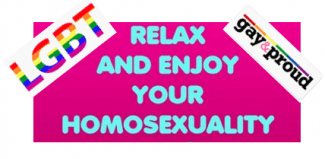When it comes to talking about our community, there's often a disagreement as to labels, names, etc. Do we call it same-sex marriage or marriage equality? Do we use LGBT or LGBTQI? Last week someone was disgusted when we reported on two men being found guilty of sodomy, but when that is the legal wording of the Indonesian law, it's hard to change it.
What about the choice to use "gay" or "homosexual" to represent our community? Which one is better? When gay is used, comments are the word gay just stands for homosexual men and that is it. Others are okay with gay representing the entire rainbow community. Homosexual, it's such a long word and semi sterile, right? But is it a better word to use?
Matthew Motta is a PhD candidate at the University of Minnesota. In a recent article in The Washington Post, he talks about his research. The abstract reads:
Multiple identity and identification terms are used in social science research on sexuality, including clinical terms such as “homosexual” and “heterosexual” and more colloquial terms such as “gay” and “straight.” In this article, we show that far from being synonyms, these terms have consequences for attitudes about gay and lesbian rights. We begin by providing a historical overview of the terms “homosexual” and “gay and lesbian,” showing the different connotations that social groups have come to associate with these terms. We then analyze a split-ballot experiment embedded in the 2012 American National Election Study (ANES) and show that group identity and authoritarianism shape attitudes toward “homosexual” rights differently than “gay and lesbian” rights. – American Politics Research
For the full research and more coverage, head over to The Washington Post. The data points to a significant difference in reception when gay and homosexual are used.
We find that opposition to “homosexual rights” was 16 percent higher for those scoring most highly on the authoritarianism scale who did not personally know someone with same-sex attractions, when compared with those scoring at the lowest level. Again, when asked about “gay rights,” we observed no differences between the two groups.
Overall, our research suggests that the terms “gay” and “homosexual” can be used strategically to sway public opinion among certain large and politically relevant groups. Highly authoritarian born-again Christians make up 21 percent of the U.S. voting-age population. Highly authoritarian people who do not personally know someone with same-sex attractions comprise 23 percent of the American voting-age population.
It is important how we in the community feel with the labels we use, but it may be more important how we "label" ourselves for those outside of our community for there maybe a bigger impact.
Words that appear to be synonymous may, in fact, have very different political implications.
h/t: The Washington Post.



Years back, for many,
Years back, for many, homosexual was the orientation and gay was the lifestyle. It often had more to do with acceptance. Today I see it as a clinical title and gay as who I am.